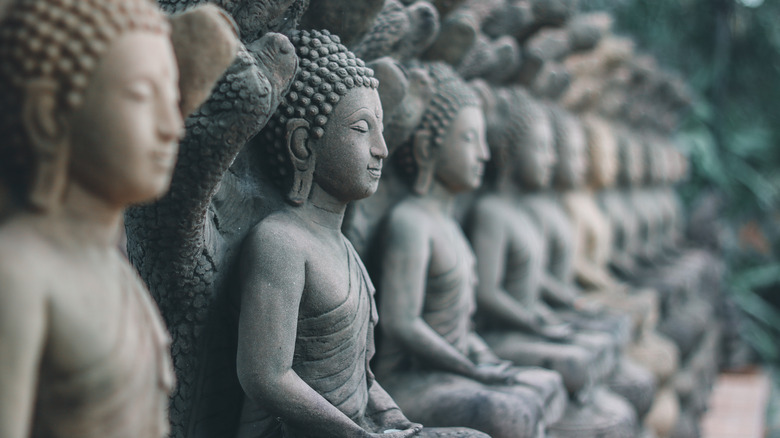The Three Poisons In Buddhism Explained
Most of us have heard of the infamous Seven Deadly Sins that, according to Catholicism, forge the pillars of all sinful behavior here on Earth and proliferate evil far and wide. Greed, lust, pride, wrath, sloth, gluttony, and envy. Maybe you've seen the movie "Se7en" enough times to know them by heart (per IMDb), or perhaps this is the first time you've ever even heard of the Seven Deadly Sins. What about the Three Poisons in Buddhism? That eastern religion has its own similar list of bad behaviors that are reputed to plague the human spirit: greed, hatred, and delusion (via Tricycle).
According to a 2012 report by the Pew Research Center, there were about 488 million Buddhists in 2010, which constituted about 7% of the world's population. Most people know that it's an especially introspective theology that emphasizes meditation and transcendence, but even in paradigms of a deeply subjective nature, there's still some semblance of a universal moral code that all practicing members should abide by. The Three Poisons is part of that code.
Greed (Raga)
It would appear that greed resides in all dark corners of the human spirit, given that it's both one of the Seven Deadly Sins and one of the Three Poisons. According to Tricycle, greed, or "raga," is personified as a rooster in the Buddhist religion. Greed is known to elicit a sort of insatiable longing for more and more of something, be it sex, money, validation, material objects, or something else entirely. When we live in greed, we are forever doomed to a vicious cycle of want that can never be fully rectified, as the Sunyata Buddhist Centre reports. On a global scale, greed manifests itself in the form of political discord, war, and environmental decay (among other things).
Tricycle reports that each one of the Three Poisons has its virtuous counterpart that is designed to negate the destructive effects of our ravenous nature. In order to hinder the infectious defect of greed, Buddhists stress the importance of generosity (dana).
Hatred (dvesha)
Hatred, or dvesha, is represented by a snake (via Tricycle). On their website, the Sunyata Buddhist Centre states that "the symptoms of hatred can show up as anger, hostility, dislike, aversion, or ill-will; wishing harm or suffering upon another person." This one's pretty self explanatory. Buddhists warn that the effects of living in hatred spell out perpetual discontent and conflict with those around us. We make a myriad of enemies and are constantly concocting ways to exact vengeance upon those we despise. It's a way to protect the ego and augment selfish ambitions that inevitably harm our fellow humans and ourselves.
Through hatred, we desperately attempt to thwart feelings of fear, depression, loneliness, longing, and vulnerability, making it virtually impossible to know our true selves or grow as healthy souls. In a world full of enemies, we are our own arch nemesis, ironically enough (per Suntaya Buddhist Centre). In order to combat the rabid chimera that is hatred, Tricycle reports that we must supplement it with lovingkindness (maitri).
Delusion (moha)
The third poison is delusion, or moha. Delusion is depicted as a pig in Buddhist iconography. Basically, delusion separates us from true reality, so we're unable to feel contented in any way. We lose our grip on harmony and life as a whole and find ourselves in pursuit of the wrong things. We cannot establish a clear cut path to happiness or positivity if we entertain the state of delusion, and are therefore incapable of accessing virtue in any form (per Suntaya Buddhist Centre).
In order to contend with delusion, we must seek wisdom (prajna) in its place. When we successfully supplement the Three Poisons with their corresponding solutions, we are finally able to enter the realm of nirvana, as Tricycle reports. The timeless and foreboding words of Gautama Buddha are as stoic as ever: "Inflamed by greed, incensed by hate, confused by delusion, overcome by them, obsessed by mind, a man chooses for his own affliction, for others' affliction, for the affliction of both and experiences pain and grief" (via "The Buddha: A Very Short Introduction").



